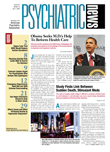Psychiatrists and other physicians are increasingly likely to face major changes in the way Medicare and other federal health insurance programs reimburse them under varying health reform proposals before Congress.
Uncertainty over the new method that lawmakers will devise for reimbursing physicians under any new public insurance or overhauled Medicare program has been a concern for physicians watching the health reform debate unfold.
The Medicare payment system, called the sustainable growth rate formula (SGR), would be replaced under a unified House Democrats' draft bill. The House approach would give physicians a general rate increase in 2010 (instead of a scheduled 21 percent cut) indexed to medical inflation and would replace the SGR with a new funding formula in 2011. A new formula would increase reimbursements annually by 1 percent more than that year's increase in the gross domestic product.
The Congressional Budget Office has estimated that just keeping physician payment rates at their current level would cost an additional $285 billion over the next 10 years.
The cost implications and the need for repeated congressional action to prevent large physician payment cuts required under the SGR formula have led many in Congress to agree that changes are needed.
“Some health care providers deliver higher quality care at a lower cost,” said Sen. Max Baucus (D-Mont.), chair of the Senate Finance Committee and a health-reform leader. “The options for delivery reform”—and payment changes to accompany such reform—“are meant to take the best ideas from people who are doing things well and apply them everywhere we can.”
Baucus's approach to physician payment would for three years replace the SGR approach of paying for specific services with a new model that reimburses for the totality of a patient's medical treatment and rewards higher-quality care. Some physicians would be paid more under such a system, which allows the creation of “accountable care organizations,” or groups of physicians who would collaborate on ways to improve the quality of their care and reduce costs. Physicians in these exchanges could keep a portion of the money they save the government.
“Teamwork among physicians, hospitals, and other providers can help prevent costly hospital readmissions and keep patients from cycling between nursing homes, hospitals, and other post-acute-care settings,” said AMA President J. James Rohack, M.D., in a June statement on proposals to change the approach for calculating Medicare physician payment.
Although APA hasn't endorsed a particular proposal, Matthew Sturm, an associate director of APA's Department of Government Relations, said“ we're glad to see a long-term SGR fix” proposed.
